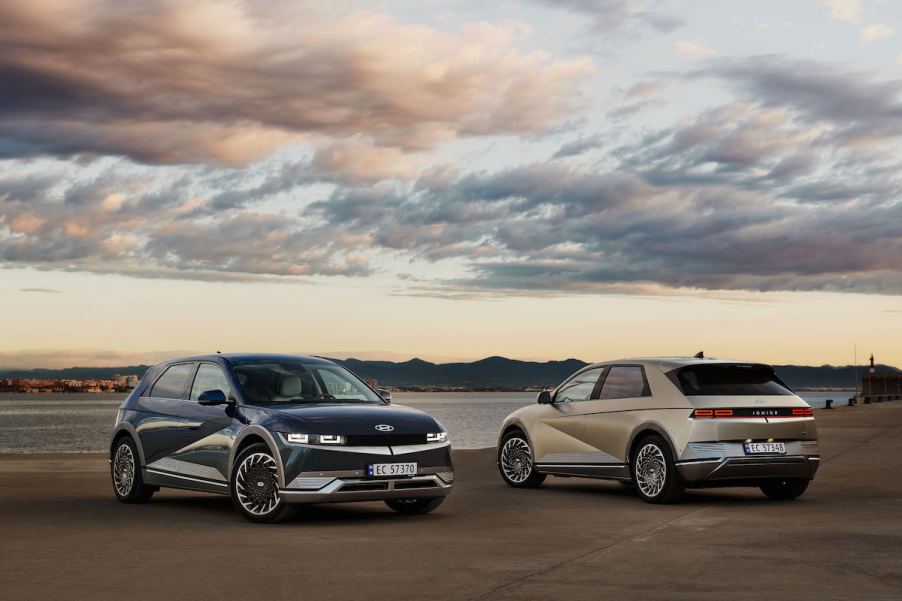
5 Reasons to Buy a 2022 Hyundai Ioniq 5, Not a Chevy Bolt EUV
Hyundai aims to make waves in the EV space with the 2022 Hyundai Ioniq 5. The South Korean automaker is marketing its brand-new model as a superior and affordable alternative to other all-electric crossover SUVs. But time will tell if it can measure up to the competition in this crowded space.
The Ioniq 5 faces off against the Volkswagen ID.4, Nissan Ariya, Tesla Model Y, Ford Mustang Mach-E, and others. One of its closest rivals is the Chevrolet Bolt EUV. However, the Ioniq 5 is the better option upon an initial review. Here are five reasons to consider a 2022 Hyundai Ioniq 5 over a Chevy Bolt EUV.
The 2022 Hyundai Ioniq 5 is eligible for the federal EV tax credit

The Obama administration helped advance the mass adoption of EVs by signing the Energy Improvement and Extension Act of 2008. Contained in this legislation was a provision that provides consumers with a $7,500 federal tax credit for purchasing an EV.
The catch: The tax credit is good for only the first 200,000 models of an EV a manufacturer makes. That means purchasing an established EV, such as the Chevrolet Bolt EUV, no longer entitles you to the federal tax credit.
However, the 2022 Hyundai Ioniq 5 qualifies for the tax credit. But keep in mind that the longer you wait to buy one, the likelier you’ll miss your opportunity to qualify.
The 2022 Hyundai Ioniq 5 has a longer driving range than the Chevy Bolt EUV
Scattershot charging infrastructure remains a problem in many parts of the United States. So buyers need EVs with a long driving range to minimize their chances of getting stranded on the road.
According to Consumer Reports, the Chevy Bolt EUV’s driving range is fair at 243 miles on a full charge. But it’s eclipsed by many of its competitors, including the 2022 Hyundai Ioniq 5, which boasts a 303-mile range with a 77.4-kWh battery pack and one motor (98 MPGe according to Consumer Reports).
Home charging equipment and mobile charging stations are indeed helping to plug the infrastructure gap. But it’s better to err on the side of caution by opting for higher range EVs, especially if you travel frequently.
The Hyundai EV also has a higher towing capacity
If you were asked which brand had a higher towing capacity, you’d likely pick Chevrolet. After all, Chevy is well known for trucks like the Silverado, which has a nearly seven-ton towing capacity, far above comparables like the Hyundai Santa Cruz. Moreover, Chevrolet’s brand is more closely associated with ruggedness and durability than Hyundai’s.
So it’s probably surprising that the 2022 Hyundai Ioniq 5 has a far higher towing capacity than the Chevy Bolt EUV at 2,000 pounds, Consumer Reports notes. In fact, the Bolt EUV wasn’t even designed for towing.
Maybe future generations of the Bolt EUV will capitalize on Chevrolet’s towing prowess. But if you’re looking at strictly 2022 models and frequently need to tow things, pick the Ioniq 5.
You’ll have more cargo space in the 2022 Hyundai Ioniq 5
In addition to boasting greater towing capacity, the Ioniq 5 also has more cargo room. It provides 60.2 cubic feet with the rear seats folded down.
By contrast, the Chevrolet Bolt EUV only has 56.9 cubic feet. That’s not bad, but it’s not as much space as the Ioniq 5. And when you’re planning a road trip, every cubic foot counts.
But a federal tax credit and greater range, towing capacity, and cargo space aren’t the only reasons the Ioniq 5 is a better buy than the Bolt EUV.
Hyundai provides a better warranty
EVs haven’t been around long. And you’ll find that not every run-of-the-mill mechanic can service an electric vehicle. Even if they could, they might have more difficulty quickly getting their hands on the parts you need for your EV. That means more time spent at the repair shop and higher maintenance costs and repair bills.
So it’s important to pay attention to an EV’s warranty coverage. And in this case, the 2022 Hyundai Ioniq 5 comes out on top with a five-year/60,000-mile warranty, Edmunds reports. The Chevy Bolt EUV provides coverage for only three years or 36,000 miles, whichever comes first.
Now, the Chevrolet Bolt EUV is a solid vehicle with a lot going for it. But the Hyundai Ioniq 5 is a better buy if you’re looking for your first or next crossover EV.


